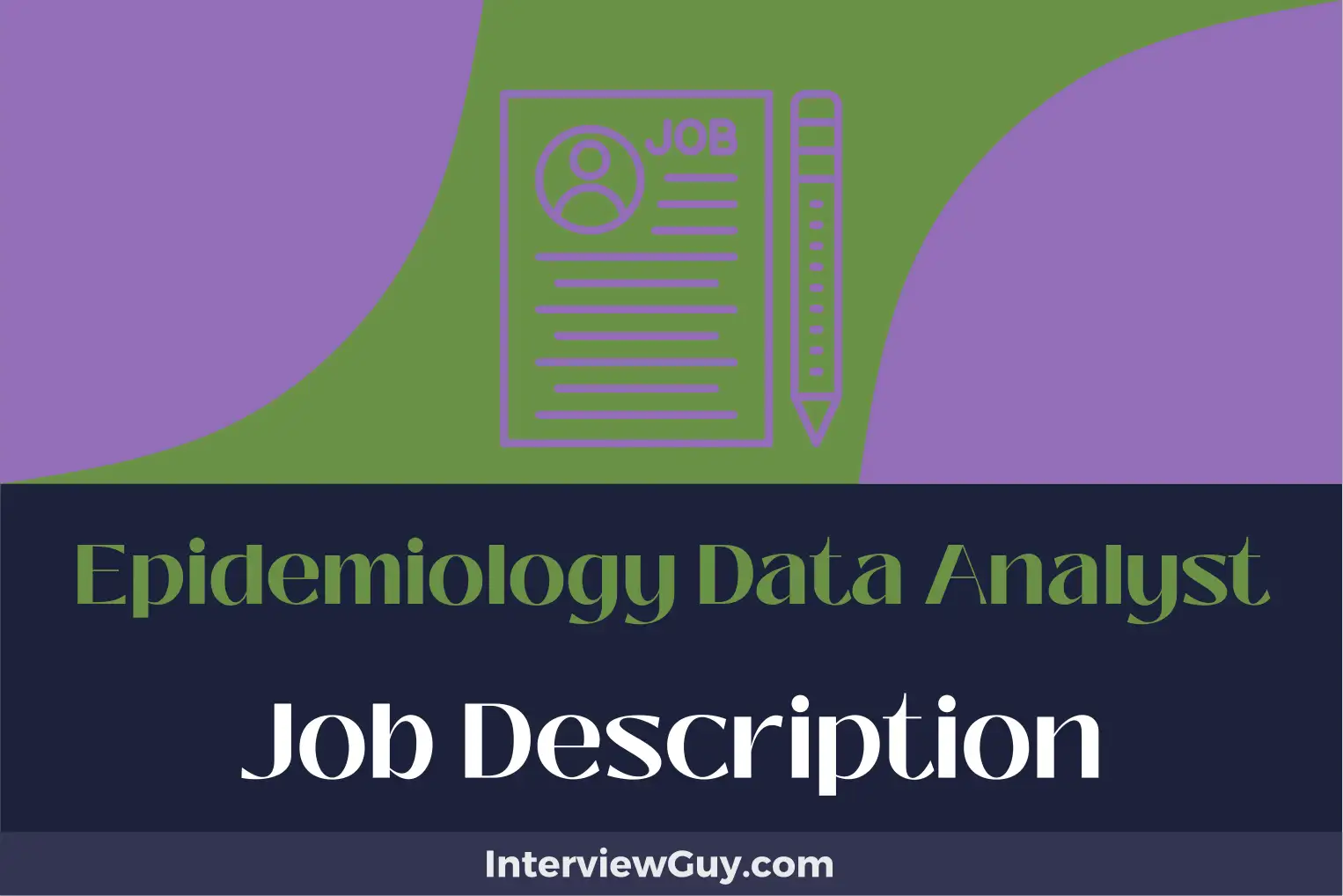Epidemiology Data Analyst Job Description [Updated for 2026]

In the era of advanced health analytics, the focus on epidemiology data analysts has become increasingly crucial.
As the health landscape progresses, the demand for skilled individuals who can interpret, analyze, and translate health data continues to grow.
But let’s delve into the specifics: What’s truly expected from an epidemiology data analyst?
Whether you are:
- A job seeker trying to understand the core responsibilities of this role,
- A hiring manager attempting to outline the perfect candidate,
- Or simply fascinated by the intricate realm of epidemiological data analysis,
You’re in the right place.
Today, we present a customizable epidemiology data analyst job description template, crafted for seamless posting on job boards or career sites.
Let’s dive right into it.
Epidemiology Data Analyst Duties and Responsibilities
Epidemiology Data Analysts play a crucial role in public health research and response, using their expertise in data management and analysis to assist in tracking and understanding disease patterns.
Their work often contributes to public health policy and planning, as well as immediate disease response.
Their duties and responsibilities include:
- Collecting, processing, and analyzing public health data
- Designing and implementing epidemiological studies and surveys
- Developing and applying statistical models to understand and predict disease trends
- Collaborating with scientists and researchers to identify and interpret public health trends and issues
- Presenting research findings in a clear and concise manner to stakeholders
- Developing and maintaining databases for public health information
- Working with health departments and other stakeholders to improve data collection and reporting methodologies
- Advising on policy and planning based on data analysis
- Continually updating knowledge on emerging diseases and epidemiological methods
- Maintaining patient confidentiality and following ethical protocols in handling sensitive health data
Epidemiology Data Analyst Job Description Template
Job Brief
We are looking for a meticulous and knowledgeable Epidemiology Data Analyst to support our organization’s epidemiological research and program evaluations.
The Epidemiology Data Analyst will be responsible for managing, analyzing and interpreting public health data from a variety of sources to contribute to the study and control of communicable diseases.
Our ideal candidate is proficient in data analysis software, statistics, and possesses a solid understanding of epidemiological principles.
Responsibilities
- Collect and analyze epidemiological data using biostatistics and database management.
- Perform statistical analysis of data collected and generate reports based on findings.
- Collaborate with researchers and other team members to develop research objectives, methods, and instruments.
- Provide insights into disease patterns and trends using complex data analysis tools.
- Identify public health issues related to epidemiological data and report findings to stakeholders.
- Assist in the design and development of disease surveillance systems.
- Develop and maintain databases for epidemiological analysis.
- Ensure compliance with local, state, and federal regulations regarding epidemiological data.
- Prepare and present reports to a wide range of audiences, including public health professionals, policymakers, and the public.
Qualifications
- Master’s degree in Epidemiology, Biostatistics, Public Health or related field.
- Experience in epidemiological or public health data analysis.
- Proficiency in statistical software, such as SPSS, SAS or R.
- Knowledge of database management and data analysis methodologies.
- Strong understanding of epidemiological principles and practices.
- Strong analytical and problem-solving skills.
- Excellent written and verbal communication skills.
Benefits
- 401(k)
- Health insurance
- Dental insurance
- Retirement plan
- Paid time off
- Professional development opportunities
Additional Information
- Job Title: Epidemiology Data Analyst
- Work Environment: Office setting with options for remote work. Some travel may be required for team meetings or conferences.
- Reporting Structure: Reports to the Lead Epidemiologist or Director of Epidemiology.
- Salary: Salary is based upon candidate experience and qualifications, as well as market and business considerations.
- Pay Range: $75,000 minimum to $120,000 maximum
- Location: [City, State] (specify the location or indicate if remote)
- Employment Type: Full-time
- Equal Opportunity Statement: We are an equal opportunity employer and value diversity at our company. We do not discriminate on the basis of race, religion, color, national origin, gender, sexual orientation, age, marital status, veteran status, or disability status.
- Application Instructions: Please submit your resume and a cover letter outlining your qualifications and experience to [email address or application portal].
What Does an Epidemiology Data Analyst Do?
Epidemiology Data Analysts primarily work in public health sectors, research institutions, hospitals, or pharmaceutical companies.
Their primary role is to collect, interpret, and analyze health-related data to understand the patterns and causes of diseases and injuries in human populations.
These professionals are essentially involved in designing, managing, and analyzing data from epidemiological studies.
They work closely with epidemiologists, biostatisticians, and health scientists to understand the data requirements and ensure the accuracy and reliability of the collected data.
They are responsible for creating statistical models, applying data management principles, and using statistical software to interpret complex data.
This data is then used to guide public health policy and disease prevention efforts.
Epidemiology Data Analysts also present the results of their analysis in a clear and understandable manner, often through charts, graphs, and other visual aids.
They may also be involved in the preparation of reports and scientific publications.
They play a crucial role in responding to public health emergencies, such as pandemics, where their data analysis helps in understanding the disease spread and informing necessary interventions.
Epidemiology Data Analyst Qualifications and Skills
An Epidemiology Data Analyst needs to possess a range of technical, analytical, and communication skills to effectively perform their role, including:
- Strong background in epidemiology, public health, biostatistics, or related field to understand and interpret epidemiological data.
- Proficiency in statistical analysis software such as SAS, R, or STATA to perform data analyses.
- Excellent analytical skills to interpret complex data and translate it into understandable information.
- Strong attention to detail to ensure the accuracy of data and reports.
- Ability to work with large data sets, understanding trends and patterns that can guide public health decisions and policies.
- Communication skills to clearly present findings to non-technical stakeholders, as well as collaborating effectively within multidisciplinary teams.
- Proficiency in data visualization tools to represent data in a way that is easy to understand.
- Problem-solving skills to identify and correct potential issues within the data or the analysis process.
Epidemiology Data Analyst Experience Requirements
Entry-level Epidemiology Data Analysts often have 1 to 2 years of experience, usually acquired through a research assistantship, internship, or part-time role in data analysis or public health research.
They may also gain on-the-job experience in roles such as Data Scientist, Research Associate, Public Health Analyst, or other related roles.
Candidates with more than 3 years of experience often develop their technical skills and knowledge in entry-level Epidemiology Data Analyst roles or similar positions.
They should have a solid understanding of statistical analysis, data modeling, and public health practices.
Those with more than 5 years of experience often have experience in leading research projects and managing data analysis teams.
They are expected to have advanced skills in epidemiological methods, data management, and the use of statistical software.
This level of experience often qualifies them for senior or managerial roles within a research team or public health organization.
Candidates for all levels of Epidemiology Data Analyst roles are usually expected to have a master’s degree or higher in epidemiology, biostatistics, public health, or a related field, as this is where they will have gained their foundational knowledge and initial experience in the field.
Epidemiology Data Analyst Education and Training Requirements
Epidemiology Data Analysts typically have a minimum of a bachelor’s degree in public health, epidemiology, statistics, biostatistics, health informatics, or a related field.
The role requires a strong background in data analysis, with an understanding of statistical software packages such as SPSS, SAS, or R.
Familiarity with data management and coding is also vital.
Some positions may require a master’s degree in Epidemiology or Biostatistics.
These advanced degrees offer specialized training in complex statistical methods and data interpretation, and enhance the understanding of disease patterns and health issues in human populations.
Professional certification, such as Certified Health Data Analyst (CHDA), can be beneficial and demonstrate a commitment to maintaining up-to-date skills.
In addition to academic qualifications, practical experience in health data management, including designing studies, collecting data, and interpreting results, is often required.
Continuing education is also important in this role due to the ever-evolving nature of data analysis tools and techniques, as well as the need to stay current with epidemiological trends and research.
Epidemiology Data Analyst Salary Expectations
The average salary for an Epidemiology Data Analyst is $74,000 (USD) per year.
However, the actual compensation can vary greatly, depending on factors such as work experience, academic qualifications, and the location of the job.
Certain organizations may also offer higher pay scales.
Epidemiology Data Analyst Job Description FAQs
What skills does an Epidemiology Data Analyst need?
An Epidemiology Data Analyst needs strong statistical analysis skills to examine and interpret data related to public health.
They should have an understanding of epidemiological methods, and be proficient in statistical software such as SAS or SPSS.
They should also have excellent communication skills to present their findings to other researchers and public health officials.
Knowledge in database management, data visualization tools and good organizational skills are also essential.
Do Epidemiology Data Analysts need a degree?
Yes, Epidemiology Data Analysts typically need a bachelor’s degree in Public Health, Epidemiology, Statistics, or a related field.
Some positions may require a master’s degree in Public Health (MPH) or Epidemiology.
They should have completed courses in biostatistics, research methods, and biology.
What should you look for in an Epidemiology Data Analyst’s resume?
Look for a strong background in statistics and epidemiology, with specific training or certifications in data analysis software and tools.
Relevant work experience in public health research or a related field is also important.
Additionally, check for any published research or studies they have been involved in, as this demonstrates their ability to apply their skills in a practical setting.
What qualities make a good Epidemiology Data Analyst?
A good Epidemiology Data Analyst is detail-oriented and analytical, with the ability to draw meaningful conclusions from complex data sets.
They should be self-motivated, capable of working independently or as part of a team, and have excellent problem-solving skills.
They should also have the ability to communicate their findings clearly to both technical and non-technical audiences.
What is the career progression for an Epidemiology Data Analyst?
Epidemiology Data Analysts can advance in their careers by gaining additional education or experience, such as earning a doctoral degree in epidemiology or a related field.
They may move into roles with greater responsibility, such as Senior Data Analyst, Lead Epidemiologist, or Director of Epidemiology.
Some may choose to focus on research and become professors or independent consultants.
Conclusion
And that’s a wrap.
Today, we’ve shed light on what it truly takes to be an Epidemiology Data Analyst.
And guess what?
It’s not just about crunching numbers.
It’s about piecing together vital health data to map the path of disease and protect public health, one data set at a time.
Armed with our comprehensive Epidemiology Data Analyst job description template and real-world examples, you’re ready to leap forward.
But why stop here?
Immerse yourself further with our job description generator. It’s your go-to tool for creating precision-crafted job listings or fine-tuning your resume to perfection.
Remember:
Every piece of data holds the potential for significant health insights.
Let’s shape the future of public health. Together.
How to Become an Epidemiology Data Analyst (Complete Guide)
Career Buzzwords: The Most Sought-After Jobs of the Year
Outrageously Odd Jobs: Careers That Break the Mold
From ER to Wall Street: A Close Look at America’s Most Stressful Jobs!

![Commissioning Agent Job Description [Updated for 2026]](https://interviewguy.com/wp-content/uploads/2024/05/commissioning-agent-job-description-768x512.webp)

![Forex Market Analyst Job Description [Updated for 2026]](https://interviewguy.com/wp-content/uploads/2024/07/forex-market-analyst-job-description-768x512.webp)
![Glazier Apprentice Job Description [Updated for 2026]](https://interviewguy.com/wp-content/uploads/2024/07/glazier-apprentice-job-description-768x512.webp)

